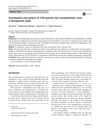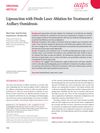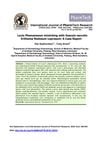 1 citations,
June 2022 in “JAAD case reports”
1 citations,
June 2022 in “JAAD case reports” A woman developed a severe skin reaction after getting a birth control implant.
 1 citations,
November 2021 in “American Journal of Clinical Pathology”
1 citations,
November 2021 in “American Journal of Clinical Pathology” The conclusion is that certain physical signs in the body can indicate past acute and chronic stress, which may help in child abuse investigations.
1 citations,
August 2019 in “Chinese Medical Journal” A man developed facial skin lesions after a stem cell transplant, which improved with specific treatments.
 1 citations,
October 2018 in “European Journal of Plastic Surgery”
1 citations,
October 2018 in “European Journal of Plastic Surgery” The study found that hair transplant complications are rare, with swelling being the most common issue.
 1 citations,
May 2018 in “Emergency Nurse”
1 citations,
May 2018 in “Emergency Nurse” Educating healthcare workers and parents about hair toe tourniquets can help prevent serious complications.
 1 citations,
January 2013 in “Archives of Aesthetic Plastic Surgery”
1 citations,
January 2013 in “Archives of Aesthetic Plastic Surgery” Combining liposuction with laser ablation effectively reduces underarm odor with minimal side effects.
 1 citations,
October 2010 in “Series in cosmetic and laser therapy”
1 citations,
October 2010 in “Series in cosmetic and laser therapy” Mesotherapy is a minimally invasive treatment with potential benefits and risks, requiring standardized practices and further investigation.
 1 citations,
January 2004 in “Journal of Physiology & Pathology in Korean Medicine”
1 citations,
January 2004 in “Journal of Physiology & Pathology in Korean Medicine” Thuja orientalis extract significantly promotes hair growth in mice with hair loss.
 1 citations,
April 1976 in “Archives of Dermatology”
1 citations,
April 1976 in “Archives of Dermatology” Sudden weight loss can cause significant hair loss, and using colchicine on the skin for psoriasis may be unsafe.
November 2024 in “Journal of Cosmetic Dermatology” Early treatment can reverse hair loss from dermal fillers.
 April 2024 in “Journal of applied cosmetology”
April 2024 in “Journal of applied cosmetology” Using hyaluronic acid fillers in the temple area of the face can improve looks but has risks, so choosing the right technique and product is important for safety.
 January 2024 in “Burns and trauma”
January 2024 in “Burns and trauma” Activating autophagy helps skin regenerate better during tissue expansion.
 November 2023 in “Journal of Drugs in Dermatology”
November 2023 in “Journal of Drugs in Dermatology” Hypochlorous acid spray improves wound healing and reduces redness and itching in hair transplant surgery.
 March 2023 in “Journal of Applied Biomedicine”
March 2023 in “Journal of Applied Biomedicine” Oleanolic acid improved hair growth in mice by affecting hair growth pathways and reducing inflammation.
 March 2023 in “European journal of internal medicine”
March 2023 in “European journal of internal medicine” The patient's long-term symptoms were due to Sheehan's syndrome, which improved with hormone therapy.
 December 2022 in “Research Square (Research Square)”
December 2022 in “Research Square (Research Square)” The ethyl acetate fraction of Ophioglossum vulgatum Linn. may promote hair growth and could be a new herbal treatment for hair loss.
 October 2022 in “Journal of advanced research in medicine”
October 2022 in “Journal of advanced research in medicine” A woman with Sheehan syndrome improved with hormone treatment.
 January 2020 in “Archives of Medicine and Health Sciences”
January 2020 in “Archives of Medicine and Health Sciences” Certain immune molecules and stress affect hair loss, and while genes play a role, more research is needed to fully understand and treat it.
 January 2020 in “International Journal of PharmTech Research”
January 2020 in “International Journal of PharmTech Research” A man with severe leprosy developed painless ulcers and numbness, treated successfully with multiple drugs and vitamins.
 April 2019 in “Journal of Investigative Dermatology”
April 2019 in “Journal of Investigative Dermatology” Fractional photothermolysis helps wounds heal with minimal scarring.
 January 2016 in “Georg Thieme Verlag eBooks”
January 2016 in “Georg Thieme Verlag eBooks” Facelift surgery has evolved to focus on natural results and safety, with patient selection and postoperative care being key to success.
 November 2013 in “International Journal of Medical and Health Sciences”
November 2013 in “International Journal of Medical and Health Sciences” Doctors often miss Hair Tourniquet Syndrome, which can lead to serious damage if not treated quickly.

Infliximab was effective in treating a scalp condition that did not respond to other treatments.
Melatonin reduced oxidative damage, inflammation, and protected hair cells in scalded rats.
 January 2007 in “Journal of The American Academy of Dermatology”
January 2007 in “Journal of The American Academy of Dermatology” Propylthiouracil, a thyroid medication, can cause skin blood clots and immune-related blood vessel inflammation.
 November 2002 in “Dermatologic Surgery”
November 2002 in “Dermatologic Surgery” Scalp reduction gives the most natural result for significant crown baldness, despite potential complications, and a systematic approach to surgical hair restoration results in few complications and high graft survival.
 July 2002 in “Australasian Journal of Dermatology”
July 2002 in “Australasian Journal of Dermatology” Maintaining anticoagulation is crucial for patients with antiphospholipid syndrome.
 July 2002 in “Australasian Journal of Dermatology”
July 2002 in “Australasian Journal of Dermatology” A woman with lupus had hair loss and skin issues that were successfully treated with medications.
 December 1994 in “The American Journal of Cosmetic Surgery”
December 1994 in “The American Journal of Cosmetic Surgery” Understanding the scalp's blood flow and using delay techniques can improve the success of hair restoration surgeries.
 January 1987 in “Side effects of drugs annual”
January 1987 in “Side effects of drugs annual” Some cosmetics and dermatological drugs can cause allergic reactions and side effects, like skin irritation and systemic issues.



























